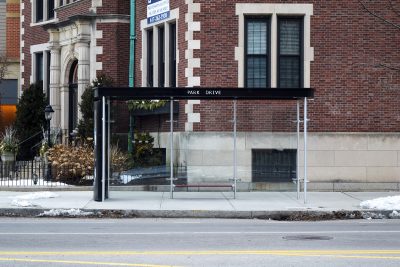Public transportation may be the engine of the city of Boston, but that doesn’t mean it works for everyone. Boston University student innovators are brainstorming how to expand the accessibility of public transportation, so the resource can truly be one for all.

Innovate@BU recently co-hosted a venture competition with Massachusetts Association for the Blind and Visually Impaired. Titled “Community Transit Design Challenge,” the competition invited students and alumni to design a trusted transportation system to tackle city traveling problems inhibiting rider accessibility.
The multi-round challenge began in October 2019. BU teams were matched with mentors in the blind community to create improvements to transportation for passengers with disabilities, and the winner for the challenge was announced on Zoom Jan. 28.
College of Engineering senior Sarah Hillesheim won the competition with “Better Bus Stops,” and received $5,000 in seed money, according to MABVI.
Her solution proposed installing “high-contrast, tactile talking buttons at bus and above-ground T stops that dictate line, stop name, and travel direction,” according to the MABVI website.
Micaelah Morrill, director of external relations at Innovate@BU and co-designer of the challenge, said the idea was inspired by a conversation in 2018 when she, along with the executive director of Innovate@BU Gerry Fine and a member of the MAB Community Services Board of Directors Beverly Brown, discussed the MABVI’s desire to work with college students.
“Part of the mission of the BUild Lab is to work with our community outside of BU’s,” Morrill said in an interview. “That is definitely headed in partnering with this organization to try to bring the potential solutions and problem solving that we teach at the BUild Lab to a wider community.”
The competition, Morrill said, also strived to set students up with the ability to apply their proposed solutions.
“We crafted the challenge in such a way so that we gave students the opportunity to have enough room within a problem to find their own solutions,” she said, “but to make sure that they were doing it for real people.”
CEO of MAB Community Services Barbara Salisbury said the judges of the Community Transit Design Challenge were “a stellar group” with expertise in solving important issues with technology, which includes designing city transportation hubs and launching tech businesses.
The initiatives “Meero” and “Naviband” were also finalists at the event. Master of ceremony Bryan Gould, who is WGBH’s director of accessible learning and assessment technologies, announced Hillesheim and her project “Better Bus Stops” as the unanimous winner.
In an interview, Hillesheim said her work was inspired by extensive research on the transportation obstacles disabled communities encounter.
“I did a lot of research, I read blogs and forums and listservs and watched YouTube videos of people talking about their own experiences,” Hillesheim said. “I spoke personally with several blind people as well to try to really understand what the problems that they face in transportation are.”
She was the sole person who created it, but was assigned a mentor through Innovate@BU, she said.
Hilleshiem wrote in an email she joined this competition to create change in transportation.
“I would consider myself a very service-oriented person, and really find my life’s meaning in trying to make the world a better place for others,” Hillesheim wrote. “So I saw this competition as a great way to potentially help create some tangible, beneficial changes.”
Through developing this project, she said she has grown both personally and professionally.
“I’ve become more comfortable talking to all types of different people in a professional context and making public presentations like a pitch,” she said. “Really pushing myself out of my comfort zone is important.”
Morrill said in an interview she is proud Hillesheim can now see herself as an entrepreneur.
“She did a tremendous job, as did our other teams, but I think sometimes too often, people can think ‘Well, I’m a mechanical engineering student, I’m not an innovator,’” Morrill said. “The truth is, anyone can have a good solution or a good idea, and at the BUild Lab… anyone can be an innovator.”
Morrill added she believes this is one of the first college challenges specifically centered around increasing accessibility for individuals with disabilities. She said she hopes people know that pursuing these solutions is beneficial for everyone.
“When we design for people who face challenges that we don’t,” Morrill said, “we really make everything better.”



























































































































